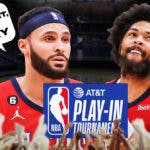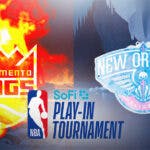When Sacramento Kings owner Vivek Ranadivé bought the team from the Maloof family, it was supposed to bring stability to a franchise on the verge of uprooting itself to a new city. But while the Kings remained in Sacramento, its direction on the court has veered recklessly in multiple directions at once.
Ranadivé and general manager Vlade Divac set out to build around DeMarcus Cousins, then fired Michael Malone, the one coach who managed to connect with their turbulent franchise player.
Then, they mortgaged part of their future—trading a future first-round pick and pick swap rights, to create cap space to sign veterans Rajon Rondo and Marco Belinelli—then pivoted to trade Cousins to the New Orleans Pelicans for pennies on the dollar; opting to build through youth.

And just when it seemed the Kings were committed to a direction, pairing trade acquisition Buddy Hield with 2017 fifth overall pick D’Aaron Fox and trading out of one draft pick to take multiple shots at talented young big men, they reversed course once more.
Determined to add veteran leaders to help mentor the Kings’ youth, Divac spent money on veterans Zach Randolph, George Hill, and Vince Carter last summer. The idea wasn't necessarily poor, yet the results were.
Last season, Sacramento won its fewest games since the lockout-shortened 2011-12 season, finishing with a 27-55 record. The offense struggled with inexperienced, mismatched parts. Led by 36-year-old Zach Randolph, the Kings produced an offense putrid in process and production. Sacramento averaged just 98.8 points per game on just 94.9 offensive possession, both the worst marks in the league.
Randolph, who was supposed to be a steady security blanket, was forced into being the No. 1 option on offense, leading the team in field goal attempts per game at 12.9. While he isn’t a bad player, he wasn’t good enough to carry such a heavy workload and it showed.

Hill should’ve been a valuable asset for the Kings, coming off a career season with the Utah Jazz. Instead, he was a disaster. His game regressed and he didn’t mesh with Fox in the backcourt as well as was hoped, registering a –2.9 net rating on the court together. Hill repeatedly voiced his displeasure with the King and was traded to the Cleveland Cavaliers.
Carter was the lone bright spot among the vets, appearing in 58 games and averaging nearly 18 minutes per contest while contributing on a nightly basis.
Instead of functioning as veteran mentors for players like Fox, Hield, Bogdan Bogdanovic, Willie Cauley-Stein, or Skal Labissiere, they played prominent roles on the court, taking opportunities away from the youth.
This offseason was completely different once more for the Kings. They controversially took talented-but-flawed Marvin Bagley II from Duke with the second overall pick of the draft. They moved their second-round pick for two future second rounders; an acceptable move to add assets for the future. In free agency, Divac added a rotation player in his prime in Nemanja Bjelica (30) and one who remains relatively young in Yogi Ferrell (25) while trading away Garrett Temple to clear minutes for younger players.
These simple moves signified a change in mindset by the Kings’ front office and, during Summer League, their young talent showcased promise for a franchise in desperate need of even a sliver of hope.
Fox appeared in just one game for the Kings but showed he was clearly the best player on the court, scoring 23 points on 9-for-15 shooting with eight rebounds, six assists, and three steals.
De'Aaron Fox posts 23 PTS, 8 REB, 6 AST in the @SacramentoKings California Classic W! #NBASummer pic.twitter.com/LiANtIbwOv
— NBA (@NBA) July 3, 2018
Fox’s rookie season was a disappointment production-wise. Statistically, the Kings played better with him off the floor. But he showed the flashes of brilliant talent that make him such an intriguing prospect.
While Bagley struggled to score with efficiency, he showcased elite athleticism, a knack for crashing the boards, and promising shot-blocking potential. He has plenty of time to develop core areas of his game, such as a more complete defensive repertoire and a shooting prowess, as the Kings are not a team that will be battling for postseason position next year. He is nowhere near a complete player but is oozing with talent.
The Kings’ youth movement should benefit the rookie if Sacramento can ramp up its pace towards the top of the league, taking advantage of their youth and athleticism.
He should have success in Sacramento, because, unlike last season, they should be one of the faster-paced teams in the league, a setting Bagley will be able to thrive in with his quickness and athleticism.
https://www.youtube.com/watch?v=U5jRDCC6LSg
And the most promising performances didn’t even come from the either of these top-five picks.
Harry Giles and Justin Jackson stole the show in both the Sacramento and Las Vegas Summer League, displaying dominance and comfort while flashing attributes that should excite the Kings faithful.
Giles missed his entire rookie season last year rehabbing the injuries that dropped his draft stock from what once was considered a high lottery pick. He'll still qualify as a rookie this season and, if utilized properly, may be a part of the Rookie of the Year talks towards the end of the year. Even after two ACL tears, he is an elite athlete with explosive leaping ability and emphatic finishing expertise at the rim.
This explosion from Harry Giles is really encouraging considering his injury history. Great fluidity and a powerful slam. #Kings got a good one. pic.twitter.com/IMEyaRBtwN
— Aaron Johnson (@AJohnsonNBA) July 9, 2018
In the Las Vegas Summer League, Giles averaged 10.8 points, seven rebounds, 1.5 assists, and 1.5 steals in just 22.8 minutes per game.
Perhaps the most encouraging ability Giles displayed was a capability to connect on outside shots. In the play above, he works a quick pick-and-roll with Fox and launches a left-wing three-pointer. He shows good shooting mechanics, giving hope he can develop into a consistent threat from beyond the arc.
His ability to stretch the floor will be vital on a team without many shooters. The Kings were third in the league in three-point shooting accuracy at 37.5 percent, mostly because they shot so few at 24 attempts per game, which was the third worst mark in the league.
The two-man game between Fox and Giles becomes enticing with Giles’ shooting potential, as the point guard is a blur with the ball but struggles to connect from deep (30.7 percent). If Giles can become a pick-and-pop threat, it clears the way for Fox to attack the rim.
Justin Jackson received a large role in Summer League and ran with the opportunity, showcasing a multi-faceted scoring game, averaging 18.14 points per game while shooting 45.5 percent from the floor.
Buy all your stock in Justin Jackson right now. Again, his comfort putting the ball on the floor is crucial in his potential. Patient here waiting for the screen, puts it on the floor, and drills a deep 3-pointer. pic.twitter.com/UNzvG8cFtZ
— Aaron Johnson (@AJohnsonNBA) July 9, 2018
The Kings also have Bogdanovic, who made the All-Rookie Second Team last season, averaging 11.8 points per game last season on 44.6 percent shooting from the field, 39.2 percent from the three-point line, and 84 percent from the free-throw line.
I have no idea how Bogdan Bogdanovic made this pass: pic.twitter.com/zaSKVxe9hR
— Jackson Frank (@jackfrank_jjf) August 12, 2018
Bogdanovic also possesses value as a secondary playmaker. Last season, he averaged 3.3 assists per contest, displaying a high IQ with the ball in his hands. He has the skills of a well-versed offensive player and his role should only expand after such a successful rookie campaign.
With other young, polished players such as Buddy Hield and Willie Cauley-Stein, the Kings are blushing with talent. They won't approach the playoffs next season, but they should be a fun group to watch mature throughout the season as we learn which young pieces fit best together.
After years of wandering aimlessly on the court, the Kings are finally headed down a path where failure and despair will be left by the wayside.




